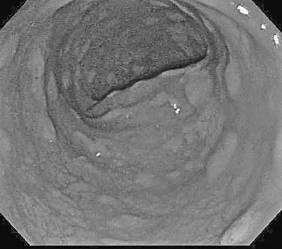A 45-year-old female develops fever, dysuria, and back pain and is admitted to the hospital after evaluation in the ER discloses pyelonephritis. The patient is placed on broad-spectrum antibiotics and has a good improvement in her symptoms. On hospital day 4, the patient develops a new fever, leukocytosis, and profuse watery diarrhea. A colonoscopy is performed and the following finding is seen
What is the first-line therapy for treating this disorder?

- metronidazole
- vancomycin
- oral corticosteroids
- rectal administration of topical corticosteroids
- sulfasalazine
Answer(s): A
Explanation:
The colonoscopy image demonstrates the pseudomembranes classically seen in pseudomembranous colitis, also known as Clostridium difficile colitis. C. difficile colitis is commonly encountered in patients on broadspectrum antibiotics, although almost any antibiotic can predispose a patient to this illness. The disease is toxin mediated, and is frequently seen when antibiotics disrupt the normal balance of gut flora, allowing C. difficile to more widely colonize the bowel than it would normally. Crohn colitis and ulcerative colitis would have different patterns of ulceration of the mucosa, which is not seen here. Ischemic colitis would appear as an area or areas of blanched, edematous, or frankly necrotic mucosa due to an interruption of vascular flow. Microscopic colitis, which can cause a chronic form of watery diarrhea, typically has a normal appearance at colonoscopy. The first-line therapy for patients diagnosed with pseudomembranous colitis is typically a course of oral metronidazole. Patients can also receive oral vancomycin, although this is usually reserved for persistent or recurrent infection. Oral vancomycin also carries a much higher cost than metronidazole. Oral or topical= steroids would be contraindicated in the setting of an infection, although these medications are frequently used in patients with IBD such as ulcerative colitis or Crohn colitis. Sulfasalazineis a topical anti-inflammatory agent that is also sed for patients with IBD.